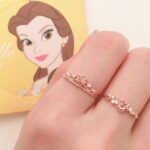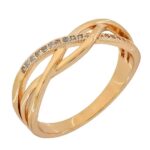What is the difference between fashion and fine jewelry? Understanding this distinction is essential for anyone interested in accessorizing with jewelry, as it can impact both personal style and financial decisions. Fashion jewelry and fine jewelry are two distinct categories that vary in materials, quality, design, pricing, occasions, branding, craftsmanship, and value. This article aims to define and explore these key differences to provide a comprehensive understanding of both types of jewelry.
Fashion jewelry typically consists of trendy and affordable pieces made from materials such as base metals, plastic, glass, and semi-precious stones. On the other hand, fine jewelry is crafted from high-quality materials such as gold, platinum, sterling silver, diamonds, and gemstones. Recognizing these distinctions in materials and quality can help consumers make informed choices about their jewelry purchases based on their budget and preferences.
In addition to materials and quality, the design plays a significant role in differentiating fashion jewelry from fine jewelry. Fashion jewelry often offers a wide variety of designs that reflect current trends and styles. In contrast, fine jewelry provides exclusivity and customization options through traditional craftsmanship techniques. The influence of trends is also more pronounced in fashion jewelry design compared to the timeless elegance associated with fine jewelry.
Materials and Quality
When it comes to jewelry, one of the most fundamental differences between fashion and fine jewelry lies in the materials used and the overall quality of the pieces. Fashion jewelry, also known as costume jewelry, is typically made from base metals, plastic, glass, and synthetic gemstones. These materials are chosen for their affordability and versatility in design.
On the other hand, fine jewelry is crafted from precious metals such as gold, platinum, and sterling silver, often adorned with authentic gemstones like diamonds, rubies, sapphires, and emeralds. The use of these high-quality materials contributes to the value and prestige of fine jewelry.
In terms of quality standards, fashion jewelry is often mass-produced using lightweight components that may not withstand regular wear over an extended period of time. Fine jewelry, however, adheres to strict quality control measures to ensure durability and longevity. This includes considerations such as metal purity (measured in karats for gold), gemstone authenticity and clarity, and precise craftsmanship in intricate designs. Consequently, fine jewelry can be passed down through generations as valuable heirlooms due to its enduring quality.
| Fashion Jewelry | Fine Jewelry |
|---|---|
| Made from base metals and synthetic gemstones | Crafted from precious metals with authentic gemstones |
| Often mass-produced with lightweight components | Adheres to strict quality control measures for durability |
| May not withstand regular wear over time | Intended for long-term use and heirloom value |
Design and Customization
When it comes to the design and customization of jewelry, there are significant differences between fashion and fine jewelry. Fashion jewelry often boasts a wide variety of designs, ranging from trendy statement pieces to fun, quirky styles. These pieces are often mass-produced, allowing for a vast array of options at affordable price points.
On the other hand, fine jewelry offers exclusivity and customization options that cater to individual preferences. Whether it’s through personalized engravings, bespoke designs, or one-of-a-kind gemstone selections, fine jewelry allows for a unique and personalized touch that sets it apart from fashion jewelry.
In the world of fashion jewelry, trends play a significant role in determining popular designs and styles. Pieces are often created to reflect the latest fashion trends and can easily be updated to keep up with ever-changing styles. This means that fashion jewelry is more likely to embrace fleeting trends, making it a perfect option for those looking to accessorize with current fashions.
Fine jewelry, on the other hand, tends to prioritize timeless designs that hold their appeal regardless of passing trends. With an emphasis on enduring elegance rather than fleeting fads, fine jewelry remains relevant throughout time.
When considering the difference between design and customization in fashion versus fine jewelry, versatility also plays a key role. Fashion jewelry is often designed with specific occasions or outfits in mind, offering a versatile range of options for different looks.
On the contrary, fine jewelry is known for its ability to transcend various events and settings with unmatched sophistication and allure. From everyday wear to special occasions such as weddings or galas, fine jewelry effortlessly adapts to different moments while retaining its inherent value.
– In conclusion –
Pricing and Value
When it comes to pricing and value, the disparity between fashion jewelry and fine jewelry becomes even more apparent. Fashion jewelry is typically more affordable and caters to a wider range of budgets. This type of jewelry is often made from less expensive materials such as plastic, glass, or base metals like brass or copper. As a result, fashion jewelry tends to be priced lower than fine jewelry.
On the other hand, fine jewelry commands a higher price due to its use of precious metals like gold, platinum, and silver, as well as gemstones such as diamonds, sapphires, rubies, and emeralds. The investment value and long-term worth of fine jewelry are significantly higher compared to fashion jewelry. Fine jewelry also holds its value over time and can even appreciate in certain cases, making it a popular choice for heirlooms and investment pieces.
Moreover, when considering resale value and depreciation, fine jewelry tends to retain its worth much better than fashion jewelry. While fashion pieces may be trendy and stylish at the time of purchase, they often lose their appeal as new trends emerge. On the contrary, classic designs and high-quality materials in fine jewelry make them timeless pieces that can be handed down through generations or sold for a good price in the future.
- Fashion Jewelry: Created with non-precious materials
- Fine Jewelry: Utilizes precious metals and gemstones
- Investment Value: Higher for fine jewelry due to quality materials
- Resale Value: Greater retention of worth for fine jewelry
Occasions and Versatility
Fashion jewelry is often designed with the latest trends in mind and is more suited for casual or everyday wear. It is typically made with less expensive materials such as base metals, plastic, and glass.
On the other hand, fine jewelry is crafted from high-quality materials such as gold, silver, and platinum, and is designed to last for many years. Fine jewelry is often associated with special occasions such as weddings, anniversaries, or formal events due to its timeless and elegant nature.
When considering the appropriateness of fashion vs. fine jewelry for different occasions, it’s important to take into account the cultural and social significance attached to certain pieces. Fashion jewelry may be more suitable for fun and trendy events while fine jewelry carries a level of sophistication that makes it ideal for formal gatherings or important celebrations.
Additionally, fine jewelry tends to have a higher versatility as it can be worn across various occasions without feeling out of place due to its classic designs and precious materials.
In terms of sentimental value, many individuals choose fine jewelry for milestone events in their lives due to its enduring nature. With proper care, fine pieces can become family heirlooms that are passed down through generations.
Fashion jewelry may not hold the same sentimental value but offers flexibility in trends and styles that allows individuals to express their personality through accessories at any given time. Therefore, understanding the difference between fashion and fine jewelry can help individuals make informed choices based on their personal preferences and specific occasions they want to adorn themselves for.
| Occasions | Versatility |
|---|---|
| Fashion Jewelry | More suited for casual or everyday wear |
| Fine Jewelry | Associated with special occasions such as weddings or formal events; higher versatility due to timeless designs |
Branding and Marketing
Brand and marketing play a significant role in the world of fashion and fine jewelry. Understanding the difference in how these two types of jewelry are positioned, presented, and perceived by consumers is essential for both industry professionals and customers alike.
Role of Branding in Fashion Jewelry
Fashion jewelry often relies heavily on branding to create its identity and appeal to consumers. Brands in this category focus on trends, fast turnover, and mass appeal. They may collaborate with fashion designers or influencers to gain visibility and relevance within the market. The emphasis is more on the aesthetic value and current style rather than long-term investment.
Marketing Strategies and Consumer Perception
In the realm of fashion jewelry, marketing strategies often revolve around social media, influencer partnerships, and fast-fashion retail outlets. The goal is to create a sense of urgency and desire among consumers by tapping into current trends and creating a perception of affordability and accessibility.
Luxury Branding in Fine Jewelry
On the other hand, fine jewelry relies on luxury branding to convey notions of exclusivity, heritage, craftsmanship, and prestige. Established brands place a strong emphasis on provenance, quality materials, artisanal techniques, limited editions or one-of-a-kind pieces as well as personalized experiences for their clients. Marketing efforts aim to communicate the narrative behind each piece while highlighting its intrinsic value.
The difference between fashion jewelry’s emphasis on trends and mass appeal compared to fine jewelry’s focus on heritage, craftsmanship, exclusivity is clear in their branding and marketing approaches. Understanding these distinctions can help consumers make informed decisions when purchasing jewelry based on their individual preferences and values.
Craftsmanship and Techniques
When it comes to the craftsmanship and techniques used in creating fashion and fine jewelry, there are significant differences that contribute to the overall quality and value of each type. Fashion jewelry is often produced using mass production techniques, with the primary focus on efficiency and cost-effectiveness.
This means that fashion pieces are typically made in large quantities, using machinery and standardized processes. As a result, the level of attention to detail and individual artistry may be lacking compared to fine jewelry.
On the other hand, fine jewelry is crafted using traditional techniques that prioritize quality, precision, and artisanship. Many fine jewelry pieces are created using handcrafted methods by skilled artisans who specialize in specific techniques such as engraving, setting gemstones, or intricate metalwork. These time-honored practices ensure a level of craftsmanship that adds to the uniqueness and value of each piece.
Artisanal and handcrafted processes also play a significant role in fine jewelry production. These methods involve meticulous attention to detail and personalization, resulting in one-of-a-kind pieces that showcase exceptional skill and dedication. In contrast, fashion jewelry may lack the individualized touch that comes with artisanal techniques, as its primary focus is on producing a high volume of trendy styles at an affordable price point.
Conclusion
In conclusion, it is evident that the difference between fashion and fine jewelry extends beyond the surface level of aesthetics and price. The materials, quality, design, pricing, value, occasions, versatility, branding, marketing, craftsmanship and techniques all contribute to distinguishing these two categories of jewelry. Understanding these disparities is essential for consumers to make informed decisions when purchasing jewelry for various purposes.
While fashion jewelry may offer trendy designs at affordable prices, it often lacks the durability and long-term value associated with fine jewelry. On the other hand, fine jewelry boasts superior quality materials, exquisite craftsmanship, and investment value that transcends fleeting fashion trends. This distinction should be carefully considered based on individual preferences and intentions behind acquiring jewelry.
As trends in the industry continue to evolve, it is likely that a fusion of fashion and fine jewelry concepts will emerge. Consumers can expect to see more customizable options in both categories while still maintaining their respective standards of quality and craftsmanship. Ultimately, whether one decides to indulge in fashion or invest in fine jewelry depends on their personal preferences and understanding of the differences between the two.
Frequently Asked Questions
What Are the 3 Types of Jewelry?
The three types of jewelry are fine jewelry, fashion jewelry, and costume jewelry. Fine jewelry is made of high-quality materials like gold, platinum, and precious gemstones. Fashion jewelry is typically made with less expensive materials and is more trend-focused. Costume jewelry is often made with non-precious metals and imitation or synthetic gemstones.
Is Sterling Silver Fine or Fashion Jewelry?
Sterling silver is considered fine jewelry rather than fashion jewelry. It is a popular choice for fine jewelry due to its durability and timeless appeal.
Sterling silver is made of 92.5% silver mixed with 7.5% other metals, usually copper, to increase its strength. This makes it a durable and high-quality choice for fine jewelry pieces like rings, necklaces, and earrings.
What Is the Fine Jewelry Category?
The fine jewelry category includes pieces made from high-quality materials such as gold, silver, platinum, and precious gemstones like diamonds, rubies, sapphires, and emeralds. Fine jewelry is known for its craftsmanship, durability, and lasting value. It often includes items like engagement rings, wedding bands, heirloom pieces, and luxury accessories.

Welcome to my jewelry blog! My name is Sarah and I am the owner of this blog.
I love making jewelry and sharing my creations with others.
So whether you’re someone who loves wearing jewelry yourself or simply enjoys learning about it, be sure to check out my blog for insightful posts on everything related to this exciting topic!





